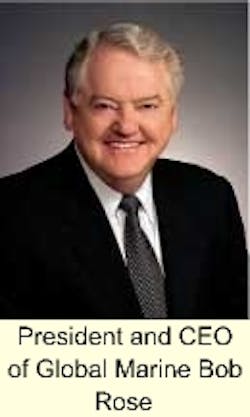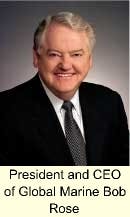Drilling rig contractor mergers may not be over yet
In the wake of Transocean Sedco Forex's bid to buy R&B Falcon, Bob Rose, Chairman, President and CEO of Global Marine, said that mergers among drilling rig contractors may not be over yet. Rose has historically been an advocate of mergers in the offshore drilling industry, stating that it is too fragmented and has too many small players. In a meeting with Offshore Magazine, he spoke further of the effects of consolidation on the drilling rig market.
Offshore: Reading & Bates purchased Falcon Drilling, Transocean bought Sedco Forex, and now Transocean Sedco Forex is buying R&B Falcon. That is a lot of consolidation in a short period of time. How will this affect the industry?
Rose: Consolidation is good for the industry. I certainly don't think there has been too much. I'd like to see further consolidation of the business.
Offshore: This most recent deal, if it goes through, will give one company 42% of the deepwater market. How does that leave room for further consolidation?
Rose: This combination went a long ways toward consolidating the floater or deepwater end of the market. But, there is a lot of fragmentation in other areas of the market. I would like to see further consolidation in those areas.
Offshore: What areas of the offshore rig market do you see as ripe for consolidation?
Rose: The jackup market is the primary area where consolidation should occur. It remains fragmented. Also, there are a lot of floaters out there held by small companies. In the second and third-generation semisubmersible market, consolidation would be healthy.
Offshore: In what areas of the market would further consolidation be a mistake?
Rose: I don't believe the US Justice Depart-ment would allow Transocean Sedco Forex to consolidate much more of the ultra-deepwater market, but it is conceivable that a company like Global Marine might decide to add that type of equipment to our fleet. I think that would be a healthy thing if it were to occur.
Offshore: R&B has some state-of-the-art ultra-deepwater vessels, but the company also owns some older shallow-water rigs. If the goal of the merger was to consolidate deepwater assets, do you think Transocean Sedco Forex will hold onto the entire fleet?
Rose: That's a market I don't think Trans-ocean really wants to be in. Over time, you would expect to see Transocean Sedco Forex divesting itself of the shallow water barges and perhaps the shallow-water jackups.
Offshore: How does this consolidation affect the other players in deepwater, including Global Marine?
Rose: Most of us have pretty good balance sheets and an awfully good outlook for the next three years or so. There is no pressure for us to combine. However, if there is a second merger on this scale, the landscape would change. This would compel the remaining drillers to seriously look at combinations that would allow them to achieve size.
Offshore: You don't see a company with 24% of the global offshore drilling market and 42% of the deepwater market as a threat?
Rose: What you have to consider, when you look at that company and those markets, is the availability of premium equipment. In the jackup market, the combined company does not have the premium equipment. That means there are still some very healthy competitors in the shallow end of the market. However, in the deepwater market there is no question - they have premium equipment and can certainly be an industry leader.
Offshore: How will this strength in deepwater affect other drilling companies, such as Global Marine, who recently invested heavily in new equipment to participate in the ultra-deepwater market?
Rose: How this will affect the rest of us is yet to be determined. I think there are a couple of strategies they could pursue. On the one hand, they could say: "We've got 70 floating rigs and we're going to keep our rigs working." That would imply a willingness to keep those rigs working, even at below-market day rates. On the other hand, they might adopt the strategy of positioning themselves as the "swing producer." They can do this by simply holding strategic rigs off the market in order to drive up day rates. I think this is the more likely scenario and of course all of us (in the drilling industry) would benefit from that approach.
Offshore: Does that mean consolidation in the drilling market is bad news for the operators who pay these day rates?
Rose: Let me dispel any question at all that any of this is bad for the oil companies. The oil companies have the advantage of their tremendous size when it comes to these negotiations. If a drilling company tries to negotiate an operator into a corner, that operator can easily back a competing driller, offering contracts that would allow that driller to build new rigs to service the demands of the operator's drilling program. If you are a $200 billion E&P company, a $15 billion drilling contractor really is no threat at all. For example, at one time Diamond, Global, and Transocean were all trying to hold newbuild deepwater rates at a high level. Instead, Exxon turned to Marine Drilling and committed contracts that allowed the company to build its first deepwater rig. All of these oil companies are capable of being kingmakers, if they choose to do so.
Offshore: So, if this combination is not a threat to the oil companies or the other drilling contractors, what merger in this industry would you see as a threat to Global Marine?
Rose: If there is a second combination of two major contractors, then we run the risk of being marginalized. With one very large drilling contractor, the rest of us are on a level playing field, but with a second combination, the two large companies may dominate the industry.

